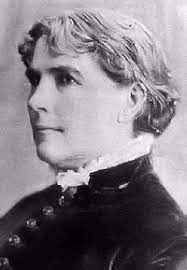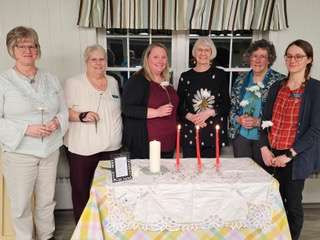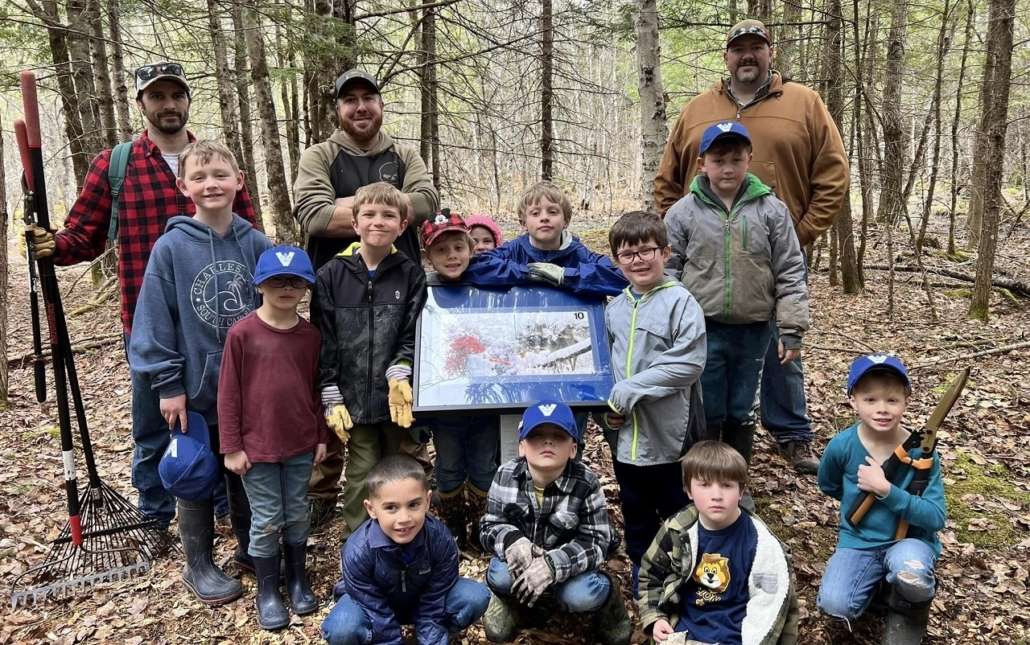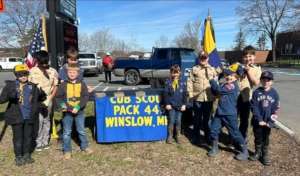As promised last week, no more ponds for a while. Instead, your writer turned to Thomas Addison’s chapter on Literature and Literary People, in Henry Kingsbury’s Kennebec County history. She hopes you will enjoy meeting a few of the writers mentioned.
Addison’s definition of literature covers almost anyone who wrote: newspaper people, historians, educators and sundry others. Your writer has chosen arbitrarily to begin with selected poets.
Many of the names Addison mentioned have no on-line references. Others are listed only as contributors to a book titled The Poets of Maine: A Collection of Specimen Poems from over Four Hundred Verse-makers of the Pine-tree State, compiled by George Bancroft Griffith and published in 1888.
Your writer found excerpts from this book on line. The samples she read have brief biographies and selected poems.
* * * * * *

Amos Lunt Hinds’ book,
Uncle Stephens
A large number of writers came from Augusta, Gardiner and Hallowell. Addison listed surprisingly few from Waterville or towns farther north, and not many from smaller towns.
An exception was the Town of Benton, identified as the home of poets Amos Lunt Hinds and Hannah Augusta Moore.
Amos Lunt Hinds (born in Benton Nov. 12, 1833, or sometime in 1834; died in Benton, April 24, 1908) was the son of Asher Hinds (born in Benton May 2, 1792; died in Benton April 23, 1860) and Lucy Harding (Turner) Hinds (1801 – July 2, 1883), who was either the first or second of his two wives (sources disagree).
The on-line description of Forgotten Books’ 2018 reprint of Amos Hinds’ 1905 Uncle Stephen and Other Verses includes Hinds’ introduction. The poet said the poems were written over 40 years; some had been published in newspapers and magazines, locally and out of state. Hinds collected them into a book “at the suggestion and request of old friends, to whom they are submitted with affectionate greeting.”
An article in the Jan. 10, 1906, issue of the Colby Echo (found on line) republishes a Dec. 27, 1905, Waterville Evening Mail article on the publication of Uncle Stephen. Hinds is described as a Colby graduate, Class of 1858, and a resident of Benton Falls.
The unnamed writer of the article mentioned several poems with local connections.
The one titled The Soldiers ‘ Monument was “read at the unveiling of the monument in this city on May 30, 1876.” The newspaper quoted one verse:
Long let this musing soldier stand,
‘Neath free New England skies,
To all that love the fatherland,
Type of self-sacrifice.
General Isaac Sparrow Bangs, in his military history included in Edwin Carey Whittemore’s Waterville history, describes the founding of the Waterville Soldiers’ Monument Association in March 1864, before the Civil War ended. Its purpose was to provide a memorial to honor Waterville residents who died in the war.
The first fund-raising events were that month. After a Nov. 29, 1865, event, Bangs wrote, the association apparently went dormant until June 1875. By then, donations and interest totaled $1,000, and the town gave a matching sum.
Association committees were formed to design the monument and find a site. Two more fundraisers May 16 and 17, 1876, added $350, and the Waterville Soldiers’ Monument, in what is now Veterans Memorial Park, at the corner of Elm and Park streets, was dedicated on Tuesday, May 30, 1876, Memorial Day.
Another of Hinds’ poems, Old Block House, was about Fort Halifax, in Winslow, the 1906 newspaper writer said.
Uncle Stephen, “the first and longest poem in the volume,” honored Stephen Crosby, whom the writer called “one of the early settlers of that portion of Winslow which lies adjacent to Benton Falls.”
Crosby owned a grist mill, and during 1816, the Year without a Summer, he “endeared himself to his generation and his memory to other generations, by refusing to profit by the distress of his neighbors, continuing to sell corn, of which he had a store, at the ordinary price.”
On-line genealogies say Amos Lunt Hinds married Lettice Orr Reed (1834 – Jan. 26, 1910), and name only one child, Lucy Turner Hinds (1866-1966). The “Colby Echo” article says Amos was the father of Asher C. Hinds, Colby 1883 (but see box on the Hinds family).
* * * * * *
Poets of Maine says Hannah Augusta Moore was born in Wiscasset on March 15 of either 1827 or 1828. Her grandfather was Colonel Herbert Moore, of Waterville; her father, Herbert Thorndike Moore, is identified as “of New York City.”
Her mother, who is not named, and her father were both poets, the biography says. The family moved to Philadelphia when Hannah was “a small child” and she started writing there. Then she lived in New York (City?) “for many years.” In 1886, she “came back” to Benton, which she called “dear native land.”
The biography does not say when Hannah had previously lived in Benton, and the following text is not helpful. It says that after her mother died (no date given), she “attended school at Waterville, Me.”
As soon as Moore settled in Benton, Ephraim Maxwell, publisher of the Waterville Mail newspaper, began publishing her work.
Moore wrote under pseudonyms, including Helen Bruce and Wanona Wandering. The biography explains that she avoided “Hannah” “from a dread that she might be supposed to consider herself a second ‘Hannah More.'”
(Hannah More [Feb. 2, 1745 – Sept. 7, 1833] was a British writer whose works included plays and poetry, mostly religious.)
The biography says it was Moore’s own choice to live “like a hidden singer in a hedge.” Her poems were available in the United States and in Europe, and many were set to music. One collection, titled “Plymouth Notes,” sold 40,000 copies in Europe in its first year.
The biography ends by quoting “June in Maine,” one of Moore’s best-known poems. The first stanza reads:
Beautiful, beautiful summer!
Odorous, exquisite June!
All the sweet roses in blossom,
All the sweet birdies in tune.
The poem urges readers to go outside and enjoy
All the dim aisles of the forest
Ringing and thrilling with song;
Music—a flood-tide of music—
Poured the green valleys along.
And
Buttercups, daisies, and clover,
Roses, sweet-briar, and fern,
Mingle their breath on the breezes—
Who from such wooing could turn?
* * * * * *

Frances Parker Mace
Frances Parker (Laughton) Mace is another Maine poet, who was a friend of Moore’s. Wikipedia says she was born in Orono, Jan. 15, 1836 (or, one source says, 1834, citing her tombstone), daughter of Dr. Sumner Laughton and Mary Ann (Parker) Laughton.
The family moved to Foxcroft in 1837. Mace’s education included Latin “and other advanced subjects” at Foxcroft Academy when she was only 10 years old. Her first poems were published when she was 12, some in The New York Journal of Commerce, Wikipedia says.
The Laughtons moved to Bangor, and Mace graduated from Bangor High School in 1852. Wikipedia says her most famous poem was published in the “Waterville Mail” when she was 18, suggesting a Waterville connection by 1854 – did she and Moore meet then? Your writer found no evidence.
This poem is titled Only Waiting. It was inspired by a friend who asked an elderly man in a poor-house what he was doing and received the reply, “Only waiting.”
The poem begins:
Only waiting till the
shadows
Are a little longer grown,
Only waiting till the
glimmer
Of the day’s last beam
is flown;
Till the night of earth
is faded
From the heart, once full
of day;
Till the stars of heaven
are breaking
Through the twilight
soft and gray.
It goes on to describe the man’s readiness to leave his weary life for the company of angels.
The poem was published in the Waterville Mail under the pseudonym “Inez.” Later, a hymn-writer named Mrs. F. A. F. Wood-White, from Iowa (according to one on-line source), claimed she had composed it, creating a dispute that was eventually resolved in Mace’s favor.
Mace married a lawyer named Benjamin Mace in 1855, and for the next 20 years was busy with eight children, four of whom died young. She began writing again when their eighth child was two years old, with a poem published in Harper’s Magazine.
Her collected poems were published in the 1880s, before and after the family moved to San Jose, California, in 1885. She died in Los Gatos, California, on July 20, 1899.
NOTE: For those interested in seeking out poems mentioned in this article, your writer found on line:
Two recent reprints of Amos Lunt Hinds’ Uncle Stephen and Other Verses: a 2016 hardcover edition by Palala Press, and a 2018 paperback by London-based Forgotten Books.
Three reprints of The Poets of Maine: in 2008 by Kessinger Publishing (Vol. 2 only); a 2017 paperback by Forgotten Books; and a 2023 paperback by Creative Media Partners, LLC.
Listed as available on amazon.com, in January 2024: copies of Frances Laughton Mace’s two poetry collections, Legends, Lyrics and Sonnets, originally published in Boston, Massachusetts, by Cupples, Upham, in 1883; and Under Pine and Palm, originally published in Boston by Ticknor, in 1888. No publisher is given.
More about the Hinds family
On-line sources say poet Amos Lunt Hinds had three younger brothers and a younger sister. The brothers are listed as Albert D. Hinds (1835-1873); Asher Crosby Hinds (1840-1863); and Roswell S. Hinds (1844-1864). The sister was Susan A. Hinds (1837-1905).
Find a Grave website says the Asher Crosby Hinds who was born Jan. 7, 1840, in Clinton, served in Company G of the Third Maine Infantry during the Civil War. He started as a corporal and mustered out as a sergeant. The website quotes the beginning of his obituary from the April 2, 1863, Piscataquis Observer, which says he died in Benton at the age of 23.
Amos and Asher’s brother Albert and his wife Charlotte (Flagg) named their first son, born in 1863, Asher Crosby Hinds.
Wikipedia says Asher Crosby Hinds, born Feb. 6, 1863, and died May 1, 1919, represented Maine’s First District in the U. S. House of Representatives for three terms, from 1911 to 1917.
The article says he attended Coburn Classical Institute and graduated from Colby College in 1883; worked for a Portland newspaper beginning in 1884; and from 1889 to 1911 held clerical positions in the Maine House of Representatives, working for the Speaker.
Hinds edited two procedural manuals, Wikipedia says, an 1899 edition of the Rules, Manual, and Digest of the House of Representatives and in 1908 Hinds’ Precedents of the House of Representatives.
The article cites a 2013 study showing the Precedents “successfully altered the behavior of House representatives, as they became less willing to appeal decisions of the chair.”
This information leads your writer to conclude that Rep. Asher C. Hinds was Amos and Lettice Hinds’ nephew, not their son.
Amos Lunt Hinds and a dozen other family members are buried in Barton-Hinds Cemetery on Eames Road in Winslow, according to Find a Grave.
Main sources
Kingsbury, Henry D., ed., Illustrated History of Kennebec County Maine 1625-1892 (1892).
Whittemore, Rev. Edwin Carey, Centennial History of Waterville 1802-1902 (1902).
Websites, miscellaneous.




 Atlanta, Ga. (Grassroots Newswire) July 3, 2024 – Two Career and technical students in central Maine were recognized at the 2024 SkillsUSA Championships, held in Atlanta, on June 26-27. Students were invited to the event to demonstrate their technical skills, workplace skills and personal skills in 115 hands-on occupational and leadership competitions including robotics, automotive technology, drafting, criminal justice, aviation maintenance and public speaking.
Atlanta, Ga. (Grassroots Newswire) July 3, 2024 – Two Career and technical students in central Maine were recognized at the 2024 SkillsUSA Championships, held in Atlanta, on June 26-27. Students were invited to the event to demonstrate their technical skills, workplace skills and personal skills in 115 hands-on occupational and leadership competitions including robotics, automotive technology, drafting, criminal justice, aviation maintenance and public speaking.





 The American Red Cross has seen a shortfall of about 25,000 blood donations in the first two months of the summer, which makes it hard to keep hospital shelves stocked with lifesaving blood products. By making an appointment to give blood or platelets in August, donors can keep the national blood supply from falling to shortage levels.
The American Red Cross has seen a shortfall of about 25,000 blood donations in the first two months of the summer, which makes it hard to keep hospital shelves stocked with lifesaving blood products. By making an appointment to give blood or platelets in August, donors can keep the national blood supply from falling to shortage levels.